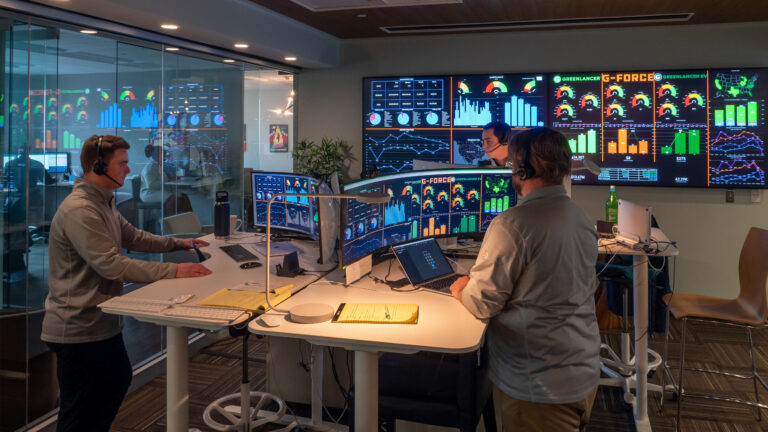
- Kim Kisner
- Business
- 07/19/2024
GreenLancer Founder and COO Talks Permitting, Solar Farms, and Labor Force

Established in 2013 in Detroit by Patrick McCabe, GreenLancer is dedicated to accelerating the adoption of solar energy and EV usage.
The company’s software platform is designed to connect solar installers with design and engineering partners while guiding the permitting process, making it easier and faster for contractors to do their work.
SBND interviewed McCabe about the current landscape for contractors in the industry.

Q: What inspired the creation of GreenLancer?
A: Following my graduation as a mechanical engineer, I moved to California and began working for a solar company. It became evident to me over time that there was a significant gap between contractors eager to install solar systems and the availability of engineering and design services to support them. Upon returning to Michigan, I founded GreenLancer with the vision of creating a platform where contractors could easily connect with engineers and designers, effectively bridging this gap. Today, GreenLancer is dedicated to advancing the adoption of clean energy and EV infrastructure, contributing to sustainability efforts not only in Southeast Michigan but nationwide.
Q: Could you explain GreenLancer’s core function?
A: GreenLancer operates as a marketplace that links contractors with engineering and design firms, streamlining processes to accelerate the installation of solar energy and EV charging stations. Since our inception in 2013, we’ve assisted over 7,500 contractors on more than 200,000 clean energy projects nationwide, totaling over $2.5 billion in solar energy and EV infrastructure investments.
Q: Those are big numbers. Can you tell us more about how those numbers are achieved?
A: We work as an online marketplace – akin to Amazon. The software connects contractors globally to design firms and engineers globally 24/7, so we can connect hundreds – even thousands – daily who then can move into the project phase. If you do the math, GreenLancer has been in existence for 11.5 years, so this equates to the support of approximately 48 projects per day being executed around the world.
Q: What challenges do contractors typically face in the solar and EV sectors?
A: The solar and EV charging industries pose unique challenges since they are so new. Many contractors lack the specialized knowledge and resources required for these installations, often necessitating costly engagements with engineering firms. Additionally, navigating the diverse and complex permitting processes across different states can be overwhelming. Issues related to utility interconnections further complicate PV installations, potentially causing delays and increased costs. These factors frequently deter contractors from entering the solar and EV markets altogether.
Q: What impact does this have on the economy?
A: Simplifying the complexities of permitting and engineering enables clean energy contractors to scale their operations, thus enhancing the economy. It also expands access to green technologies for both businesses and residents.
Q: Your website mentions incorporating concepts from lean manufacturing in the automotive industry. Can you elaborate on this?
A: As a Detroit-based company, we’ve adopted the automotive industry’s assembly line approach in a virtual capacity, optimizing our marketplace operations for efficiency and scalability. We also embrace concepts of continuous improvement methodologies and lean manufacturing used in the automotive industry to evolve alongside the needs of our users, enhancing our technology and service offerings over time.
Q: How do drones factor into the solar industry?
A: Drone use by solar companies has increased dramatically in recent years for residential, commercial, and utility-scale projects. Drones can save time, increase worker safety, and help pinpoint maintenance issues. In fact, many contractors are now using drones to gather data for solar site surveys, inspections, and marketing images. Several drone software companies specifically cater to the solar energy industry.

Q: Solar farms are controversial in many places, including Michigan, mainly over questions of land use. What are sustainable practices for solar farm installation that can help mitigate the environmental and community impact?
A: It’s helpful to consider the community and environmental impact of solar farms from the planning stage to ensure they provide the most benefit possible to the community. However, some practices are difficult or costly to implement at certain locations.
It’s best to avoid constructing solar farms on undisturbed natural areas in ecologically sensitive areas. Therefore, using already cleared land usually has less impact on wildlife and is often more cost-effective. It’s helpful to keep some existing vegetation that doesn’t shade the array and to minimize soil disturbance during construction whenever possible. Some solar farm developers are experimenting with wildlife-friendly fencing around solar farms that allows wildlife to pass seasonally or is high enough to allow small animals to pass underneath.
Another option, if space allows, is to create vegetative buffers along the fence line for wildlife habitat. Planting native wildflowers can reduce the need for mowing, promote biodiversity, and encourage pollinator populations. This can benefit nearby farmers because pollinators are essential for many crops.
Some solar farms use sheep as an alternative to mowing to manage vegetation growth, reducing the need for mechanical mowing equipment. This approach typically involves partnering with local ranchers.
Q: This is an expanding industry – is the size of the labor force keeping pace? What are the qualifications needed to get started?
A: The solar power, energy storage, and EV charging industries need many skills to expand. The 2024 Electriciation Contractor Survey highlights some issues related to the labor force for solar, energy storage, and EV charging station contractors. The report found that 49% of contractors surveyed report a lack of experience and industry-specific knowledge as a challenge for hiring qualified professionals, particularly electricians and field technicians.
Transitioning to clean energy is boosting the demand for licensed electricians. According to the Bureau of Labor Statistics (BLS), the demand for electricians is expected to increase by 6%-9% from 2022 to 2026. In addition, the North American Board of Certified Energy Practitioners (NABCEP) Certification helps launch a career in the solar industry. Various training programs are offered by trade schools, community colleges, universities, and nonprofit organizations designed to advance the clean energy industry.
Be sure to subscribe to our newsletter for regular updates on sustainable business practices in and around Detroit.
Kim Kisner
- All
- Business
- Community
- Education
- Events

Unique Monique Scented Candles, a Detroit-based business founded by Monique Bounds., aims to produce candles and household products with clean ingredients and local supply chains. What began as a personal hobby during college has evolved into a full-time venture producing coconut oil and soy-based candles made with essential oils and locally sourced materials. SBN Detroit interviewed Bounds about launching a sustainable product line, sourcing challenges in Michigan, and...

Eastern Market Partnership, in collaboration with the City of Detroit’s Office of Sustainability Urban Agriculture Division, has announced $240,000 in grant funding to support Detroit-based farmers and farmer collectives. The grants will advance food access, climate education, sustainable land use, and economic opportunity, with priority given to Black- and Indigenous-led farms, youth-led initiatives, and projects rooted in historically disinvested neighborhoods. The recipients – ranging from cooperatives and community...

Citizen Robotics is a Detroit-based nonprofit that advances the use of robotics and digital manufacturing in residential construction, focusing on improving productivity, sustainability, and long-term affordability. Best known for its early work in 3D-printed housing, it explores how alternative construction methods and new financial models can reduce material waste, lower lifetime operating costs, and enhance the resilience of homes. SBN Detroit interviewed Tom Woodman, founder and president of...







